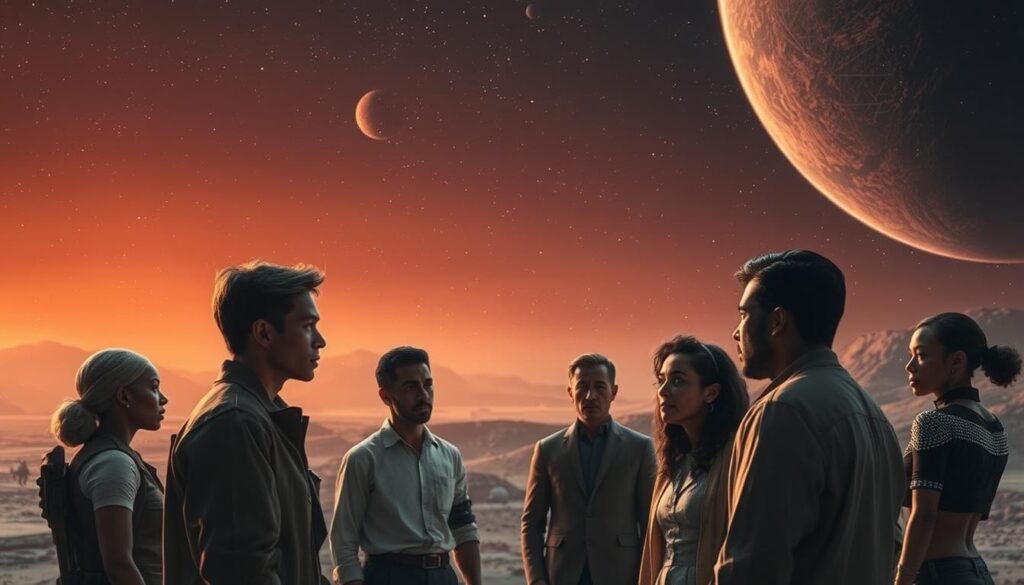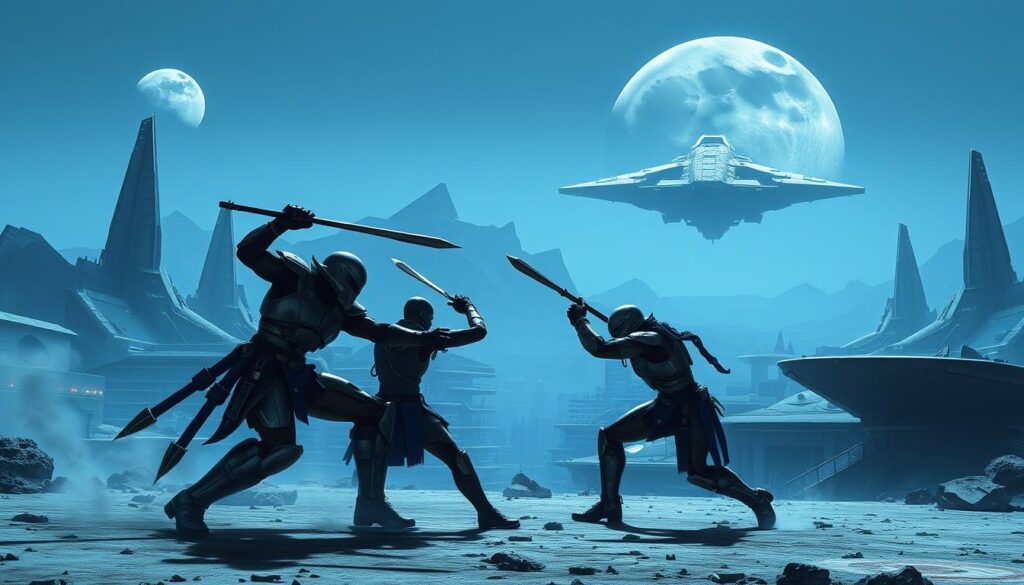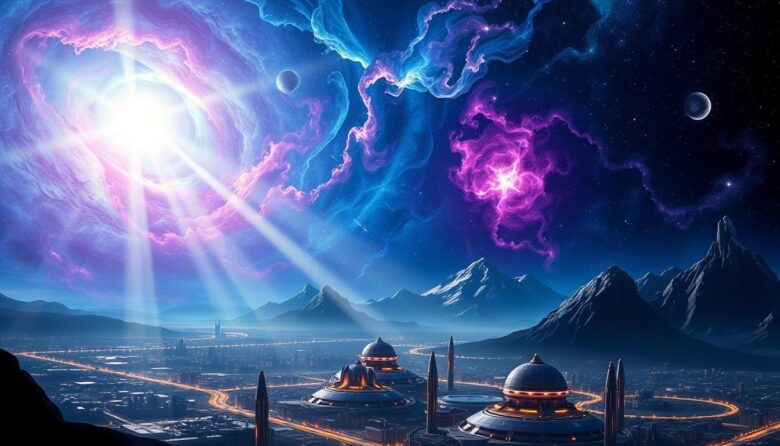Sci-fi stories take us to distant planets and futuristic societies. But their real power is closer to home. They often reveal truths about our own struggles, hopes, and choices.
Stories like Star Trek or Black Mirror explore real issues through alien worlds. They show us aspects of humanity we might overlook. This makes us see ourselves in a new light.
Key Takeaways
- Sci-fi uses other worlds to highlight human strengths and flaws.
- Stories about distant planets often reflect current social and ethical challenges.
- Imagining futures helps audiences question their own world’s norms.
- Sci-fi encourages empathy by framing complex issues through new perspectives.
- These narratives blend entertainment with lessons about society and identity.
The Power of Science Fiction in Literature
Sci-fi stories are more than just tales of space and technology. They reflect our deep curiosity about the world. From ancient myths to today’s blockbusters, this genre mixes imagination with reality. It challenges our minds and sparks new ideas.
A Brief History of Sci-Fi
Sci-fi has been around for centuries. Mary Shelley’s Frankenstein (1818) explored science ethics long before modern tech. Jules Verne’s 20,000 Leagues Under the Sea (1870) and H.G. Wells’
- 1920s–1940s: Pulp magazines like Amazing Stories made sci-fi popular. They featured Isaac Asimov and Arthur C. Clarke.
- 1960s–present: Authors like Ursula K. Le Guin and Andy Weir expanded sci-fi themes. They explored society and survival.
The Role of Imagination and Creativity
“The only way of discovering the limits of the possible is to go beyond them into the impossible.” — Arthur C. Clarke
Sci-fi stories challenge us, asking “what if?” They create worlds like Star Trek’s utopia or Blade Runner’s dystopia. These tales test our values.
Authors use alien societies to critique our world. For example, Avatar tackles climate change, and Ex Machina explores AI ethics.
Imagination in sci-fi isn’t just about escape. It’s a tool to challenge us. By imagining different futures, sci-fi encourages us to think about today’s choices.
Exploring Other Worlds: A Metaphor for Humanity
Sci-fi stories set in other worlds often mirror our own societies. They let us see familiar struggles in a new way. By placing these issues in imagined realms, authors make them easier to understand.
What Other Worlds Teach Us
- Empathy: Stories like Dune’s desert planet show the cost of scarce resources.
- Problem-solving: Fictional crises, from alien invasions to AI takeovers, challenge readers to rethink real-world ethics.
- Unity: Worlds facing shared threats often highlight the importance of collaboration over division.
The Reflection of Our Issues
Sci-fi writers often encode current events into other worlds. For instance:
- Climate change debates resurface in tales of dying planets.
- Stories about alien governments critique real political systems without naming them.
“The best science fiction asks, ‘What if?’ to make the unfamiliar familiar.” — Author Ursula K. Le Guin
Through these metaphors, readers confront uncomfortable truths while feeling safe to reflect. This makes other worlds more than escapism—they’re tools for self-discovery.
Sci-Fi as a Tool for Social Commentary
Sci-fi stories often use distant planets or futuristic tech to shine a light on today’s struggles. They frame issues like inequality or climate collapse in imaginative worlds. This helps audiences *understand* societal patterns more clearly. These tales don’t just predict the future—they decode the present.

Addressing Real-World Problems
Great sci-fi doesn’t shy away from tough topics. Stories like *Ender’s Game* explore leadership ethics, while *The Hunger Games* critiques wealth gaps. Here’s how they work:
- 1984 warns against surveillance, making readers question modern privacy laws.
- Children of Men highlights global refugee crises through a dystopian lens.
- Soylent Green uses dark humor to expose resource scarcity in overpopulated cities.
Satire and Its Implications
Satire in sci-fi exaggerates reality to make truths unforgettable. Idiocracy mocks anti-intellectualism by depicting a society dumbed down by pop culture. Meanwhile, Galactic Air’s absurd space bureaucracy satirizes corporate greed. These stories force us to *understand* how small choices today could spiral into crises tomorrow.
“Satire is truth in its Sunday clothes.” — Mark Twain
Through humor and hyperbole, sci-fi doesn’t just entertain—it demands we rethink our world.
Visualizing the Future: Utopias and Dystopias
Sci-Fi stories often show two futures: perfect utopias and failing dystopias. These stories reflect our dreams and fears. They make us think about better futures and what to avoid.
The Impact of Utopian Societies
Utopias in stories show what we could achieve. For example, Star Trek inspires us with its vision of a future where everyone works together. These stories teach us about equality and progress, encouraging us to aim for these goals.
- Star Trek’s post-scarcity society
- HG Wells’ Men Like Gods
- Ursula K. Le Guin’s The Dispossessed
Dystopian Futures as Warnings
“In dystopian storytelling, the darkest warnings often hide the brightest truths about human nature.”—George Orwell
Stories like 1984 and The Handmaid’s Tale warn us about dangers. They ask: What if we ignore our values?
- 1984’s surveillance society
- The Handmaid’s Tale’s repressed rights
- Fahrenheit 451’s book-burning regimes
Both utopias and dystopias make us wonder: Will we create a better tomorrow or make the same mistakes?
Science Fiction’s Influence on Technology
Science fiction’s craziest ideas often turn into real-life tech. Touchscreens and space travel are just a few examples. These stories spark curiosity and push the boundaries of what’s possible.
Predictions That Came True
What was once seen as fantasy now shapes our daily lives. Here are some examples:
- Smartphones are like Star Trek’s communicators, combining communication and computing.
- Arthur C. Clarke’s idea of geostationary satellites in 1945 led to GPS and global TV.
- Neal Stephenson’s Snow Crash inspired virtual reality, and Star Wars‘ holograms are now in Apple’s AR apps.
How Sci-Fi Inspires Innovation
Many engineers and entrepreneurs find inspiration in sci-fi. Elon Musk says The Martian inspired SpaceX’s Mars mission. Boeing and NASA credit 2001: A Space Odyssey for pushing aerospace design.
“The only way of discovering the limits of the possible is to go beyond them into the impossible.” — Arthur C. Clarke
Every gadget today has a spark from science fiction’s imagination. The next big invention might already be in a novel.
Characters as Reflections of Society
Sci-fi characters often show our values and conflicts. They come from different backgrounds and have their own reasons. This lets us see real-world issues in a new light.
Diverse Representation in Sci-Fi
Great sci-fi shows our world’s diversity through characters. For example:
- Disney’s Avatar: The Way of Water explores cultural identities through alien societies.
- TV’s Star Trek used its multicultural crew to address equality, blending fiction with social themes.
Heroes and Villains: A Social Mirror
Heroes and villains show our society’s struggles. Luke Skywalker’s journey from farm boy to hero shows personal and collective growth. Darth Vader’s transformation into a villain reflects our moral dilemmas.
These stories make us think about ethics and power. They mirror debates we have in our society.
The Emotional Connection to Sci-Fi Narratives
Sci-fi stories go beyond space and technology to touch our hearts. They make us feel for characters in alien wars or solving cosmic puzzles. This imagination of seeing things from another’s perspective builds empathy.
Finding Humanity in Otherworldly Stories
In Ender’s Game, Ender Wiggin’s guilt over war makes us think about our own compassion. Arrival shows how alien languages can reveal our deepest emotions. Sci-fi lets us see our feelings in new ways.
The Role of Empathy in Understanding Society
“Science fiction is the art of the possible, seen through a lens of wonder and worry.” — Ursula K. Le Guin
Empathy grows when we see characters face off against dystopian worlds. In The Hunger Games, Katniss’s fight for freedom inspires us to stand up for justice. By imagining life under harsh rules, we think about our own world’s problems.
- Stories like Annihilation explore our relationship with nature
- Time-loop tales (Groundhog Day) show how personal growth affects society
Sci-fi’s magic isn’t just in its spaceships. It’s in making us feel for beings unlike us. When we cry for synthetic beings in Blade Runner, we question what it means to be human. These moments turn fiction into a mirror, showing us the importance of empathy.
World-Building: Creating Belief Systems
Sci-fi worlds are filled with complex cultures and beliefs that reflect our own. Authors use societal reflection to explore identity, ethics, and progress. They ask: How do traditions shape who we are?
The Importance of Culture in Sci-Fi
Great sci-fi stories mirror our world in their settings. For example, Dune’s spice economy mirrors Earth’s oil dependence. Star Trek’s United Federation explores equality through its diverse crew. These elements help readers see their world in a new light.
- Religions in Avatar: The Last Airbender reflect real-world spiritual debates.
- Political systems in 1984 warn against surveillance states.
Alternate Realities and Their Lessons
“The best sci-fi doesn’t predict the future—it warns us about the present.”
Alternate realities test our societal norms. The Handmaid’s Tale shows a theocracy to highlight gender control. It urges us to rethink power. Even fictional rituals, like the Star Wars Jedi Code, teach about balance and morality.
Through world-building, sci-fi shows how beliefs unite or divide communities. Every invented holiday, law, or custom offers a new perspective. It makes us question what’s “normal” in our world.
The Role of Conflict in Sci-Fi Stories
Conflict is at the core of every sci-fi story. It can be a fight between people or whole worlds. These battles show us who we really are. For example, Star Trek explores how cooperation and division play out in tough times.

Understanding Human Nature Through Conflict
Sci-fi stories often reflect our true feelings and choices. In Dune, a leader’s ambition meets survival needs. This shows how greed or bravery can guide us. The rebellion in The Hunger Games shows how power affects communities.
These tales ask us: What would we do in extreme situations?
Resolving Issues on Other Worlds
Sci-fi characters often find solutions that inspire us. In Star Trek, talking it out beats fighting. Avatar teaches us that respecting nature can mend differences. These stories suggest real ways we could solve problems here.
Sci-fi doesn’t just entertain; it reflects on our own challenges. Every battle teaches us about being human.
How Sci-Fi Can Shape Our Values
Sci-fi stories do more than entertain. They make us think deeply about our values. By exploring extreme futures, they help us see what’s truly important today. Let’s explore how these tales shape our perspectives.
Ethical Dilemmas in Sci-Fi Scenarios
Stories like Blade Runner and Her raise big questions. For example, what rights should AI have? Or, when resources are scarce, who gets to live? These questions push us to think differently.
- Robot rights in Westworld
- Resource scarcity in The Hunger Games
- Genetic engineering in Gattaca
Lessons in Morality from Other Worlds
Sci-fi often reflects our current choices. For instance, Snowpiercer shows what happens when we try to fix climate change too quickly. It warns us about the dangers of hasty solutions.
| Real-World Issue | Sci-Fi Example |
|---|---|
| AI ethics | Ex Machina (2014) |
| Privacy | Black Mirror episodes |
| Equality | Star Trek’s universal healthcare |
These stories don’t give us answers. But they make us ask better questions. Next time you watch a movie or read a book, think: What choices would I make in their world? Your answers might surprise you.
Conclusion: A Lens for Understanding Our Reality
Science fiction is more than just space adventures or cool gadgets. It’s a way to talk about today’s big issues. Through stories, we see how empathy and creativity can change our world. Let’s learn how to use these lessons in our everyday lives.
How to Apply Sci-Fi Lessons to Our Lives
When you face tough choices, think like a sci-fi hero. If a story warns about climate change, take action. Talk about big questions like in Black Mirror to make smarter choices. Use your creativity to find new solutions, just like sci-fi inspires real inventors.
Embracing Curiosity and Imagination
Keep an open mind to new ideas. Sci-fi like Star Trek led to real tech, like smartphones. Ask yourself “What if?” to find answers. Read, watch, and share sci-fi to spark change. The future begins with questions and bold ideas.



